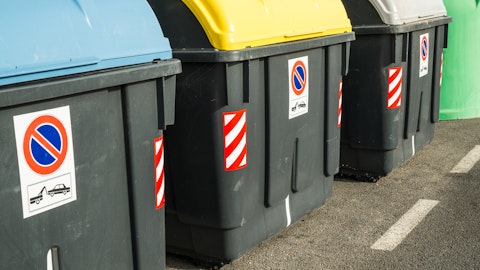Mark Duff: We are permitted for it now. We can accept it now. We have a contract with the department for this kind of type of waste through an IDIQ that we use for most of the DOE sites. So rates have been provided. And they would — when they generate the waste or are near generating waste, they’ll most likely enter into a task order with us, task order or RFP, we’ll respond to it and then they’ll ship it. So that’s typically the way it works.
Stephen Fein: With regard to the 2,000-gallon time test, there was a mention of a public comment period. Why would there be a public comment period if money has been legislated? And basically, what I’ve read, it’s basically said this should happen.
Mark Duff: The public comment period is for the RD&D permit that the state has to consider. And that’s for extraction of the waste. So I believe it’s — I’m not sure if it’s driven by a record or what it’s driven by but there’s an RD&D permit that’s required for DOE to get permission to extract the waste. And I’m not sure if I address your question or not, Stephen?
Stephen Fein: Yes. I guess I’m confused because this has been going on. I mean, the money is there, you did the first part. And I guess the issue here is that this should be a more — it would just seem to me it would be a more direct occurrence. Why should there be a discussion now with money legislated with et cetera and all the time it’s gone by?
Mark Duff: Yes. It’s part of the process. I’m not sure exactly what the regulatory drivers are for that.
Stephen Fein: All right. And the last question is with regard to the ROD in January, I mean, the ROD clearly — the spirit of that ROD clearly states that — or infers or one would infer from it — that DOE does not want to transport waste long distances. And therefore, you provide that for them. But in addition, there were 2 other things. One, they stated that all waste would be in small — only small containers, drums or boats. And further, it was stated that the secondary waste would come back to Hanford. So, I guess I’m somewhat confused. I don’t know where maybe I’m confusing the discussions that how can there be a conversation with any other suppliers wherein material would have to be shipped longer distances or not make sense in small quantities.
Mark Duff: I think you get a little confused. The DFLAW plant as addressed in the ROD, as you said, it was just for treatment and disposal locally at Perma-Fix. And large reason for that is because it, as you said, in August, disposed off on-site at Hanford at their waste cell at Hanford. So it would not make any sense to ship anything out of state and then bring it back for disposal at their facility. What we were referring to or ROD is referring to in regards to alternatives was the environmental assessment for TBI for grouting. So for grouting, because it’s not getting disposed off in state, had alternatives. Again, the increase with risk when you leave the state for the grouting part of it but that’s where the alternatives come in.
Stephen Fein: All right. And again, yes, I guess I was not clear. But I guess what hits me if they put out a ROD and they underscore that, hey, we want to not travel a long distance, we want to only ship in small containers, how these other manufacturers wherein represent long distances to get the waste to them and I would imagine as a former chemical manufacturer that shipping in small containers would absolutely be very expensive and make no sense. Anyway, that…
Mark Duff: It’s anticipated that the DFLAW waste will go anywhere besides to us regionally or locally.
Stephen Fein: Well, I’m talking — yes. Okay. All right. And again, congratulations on a great quarter.
Operator: There were no other questions at this time. I will now turn the call back to the management team for closing remarks.
Mark Duff: Okay. Thank you. I’d like to thank everyone for participating in our second quarter conference call. As I said, we remain extremely confident in the outlook for the business. We appreciate the continued support of our shareholders and we look forward to providing further updates as developments unfold. Thank you.
Operator: Thank you. This does conclude today’s conference. You may disconnect your lines at this time. Thank you for your participation.
Follow Perma Fix Environmental Services Inc (NASDAQ:PESI)
Follow Perma Fix Environmental Services Inc (NASDAQ:PESI)
Receive real-time insider trading and news alerts




